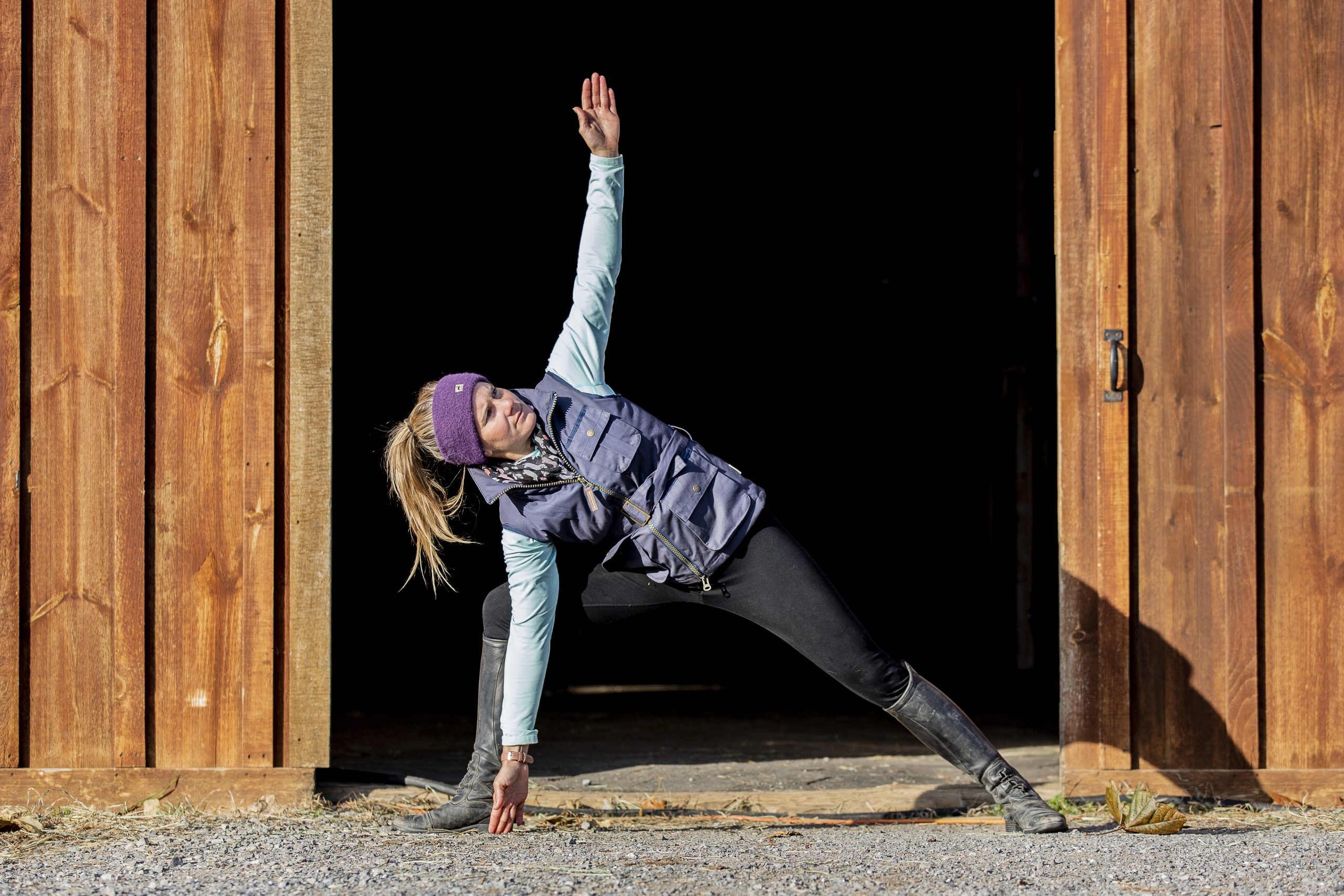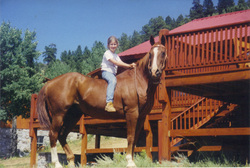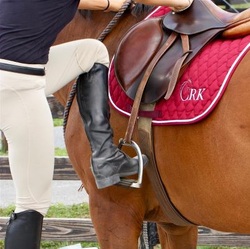How much weight can a horse actually carry? Well, one study showed that horses had increased physical stress after carrying 25% of their body weight and above, so we do need to pay attention to how much weight we ask our horses to carry.
However, as a riding instructor with 11 school horses, I can tell you that a rider’s weight is not the only factor in how comfortable a horse is while carrying their rider.
What I’ve found makes a rider most hard for a horse to carry is stiffness.
I’m not referring to stiffness in that you can’t put your foot behind your head. Stiffness in terms of bracing and resisting movement.
There are four main causes of stiffness, and we will talk about each of these in more detail in the video below.
- Acute injury (you are in pain now)
- Old injury (your body is protecting itself)
- Fatigue – the body is tired and protecting itself.
- Parasitic tension – other parts of the body may stiffen to do even simple movements
It is important to recognize that stiffness is as much in the brain as in our muscles, and is a protective mechanism in the body. The brain limits the lengthening of muscles to limit movement. It is the body protecting against injury, whether limiting movement in an area that is currently injured, preventing movement in an area that was injured, or being cautious about allowing new and unfamiliar positions or movements.
How is stiffness improved and flexibility increased?
Essentially, convince the brain that the body is safe to move. Slowly introduce new movements, gradually work the edges of your current abilities, and look for novel ways of moving that don’t trigger the same old protective patterns.
Remember, you don’t need crazy flexibility and a huge range of motion to ride well, but you do need healthy, fluid, and functional movement for ease in your riding and a happy horse under you!














11 Responses
I agree that a rider that moves with the horse is certainly easier on the horse, but if you and your tack are over 25% of the weight of the horse, you are too heavy for that horse no matter how you ride. In fact I believe 20% would be a better number if you are doing serious work. I have heard the lame excuse used by overweight riders that their superior riding skills made up for being way too heavy for the horse.
Hi Callie,
This is a subject of significant interest to me as I it appears that with age, I am not as supple as I once was. In addition, I have had some good falls (with injuries) over the years. Whilst I do not have ‘known/conscious’ specific tension arising from my age and injury history, I believe that I do brace with the worry of falling again (though acknowledge its inevitability). Are there ways to manage the generalized tension that comes with the generalized angst of falling again? I believe that my horse “feels” this generalized tension and I believe that it potentially effects his well-being. My weight (with tack) is approximately 18% of his weight. Thank you, Corinne
Corinne, as simple as it sounds have you tried practicing breathing? That is a great way to help with generalized tension in the body!
-Julia Burdy, CRK Training Community Manager
I do enjoy your insightful video’s. I am very conscious of rider weight to horses weight as 20 yrs ago I lost 138 lbs one full person. I did it because of course health issues but comfort for my horse. A couple of thoughts: I see mostly women who are (shall we say chunky) riding in saddles that are way to small for them. I feel that if your saddle fits you with a little bit to spare you are more evenly spreading your weight over the horses back. I hate seeing your back side over the cantle of the saddle. The other thing that I think forces riders to brace with their legs is the stirrup leathers whether you ride western,endurance or English. I saw a demo at a clinic last year where the instructor use a long carriage whip to point out the angles created by where your stirrups hang from the saddle which caused the stirrup to turn up or in The worst example was an endurance stirrup on a western tree which in order to get the flat bottom to be parallel to the ground. She added at least 4 in of rubber padding to the inside of stirrup to make it level with the ground. At that point I stared using my dressage saddle for trail riding and had no pain in knees or hips amazing. I was bracing and I did not realize it. Can’t wait for Yoga class Thanks
Saddle fit can have a huge effect on the rider’s position and balance and should definitely be taken into account – great point to bring up Lynelle!
-Julia Burdy, CRK Training Community Manager
I was faced with a tricky situation not long ago when my husband’s daughter and her two girls came for a visit…. The daughter had to weigh around 325 lbs. or more and was not used to riding horses. At a time when I was not out there with them, my husband said she could ride our shortest horse, then he let her ride our older horse with laminitis. I was horrified when he told me that he let her ride those horses with her weight being so heavy. And he told me he knew she was too heavy for those horses, but said “What was I supposed to do?” I appreciate this article that explains the increased physical stress horses experience after carrying 25% of their body weight. I would not want to offend anyone and tell them they cannot ride our horses because of their weight….but at the same time, I care about the well being and good health of our horses. I know the size and health condition of the horses helps to determine how much weight they could carry. Thanks for this article. Knowledge is power. (We have six horses….she wanted to ride three of them….the horses didn’t seem to experience any negative repercussions, but my husband said to give them some bute after his daughter rode them, which I did). Just out of curiosity, have you ever been faced with a similar situation? If so, what did you say?
Teri, it is a really, really tricky situation and I think it depends on the relationship you have with that person how you can handle it best. Maybe if that is the case, no one who hasn’t ridden before gets to ride that way no one feels left out.
-Julia Burdy, CRK Training Community Manager
I have a big problem that is making riding very painful, when I get on my horse, the leg that is in the stirrup, kind of shoots out, and I have a terrible pain in my hip. It has got to the stage where my body has adjusted itself, so when i get on instead of my leg going around the back of the saddle, my leg kind of goes through the middle of the saddle where you sit. I am not sure that makes much sense, but I have to admit it is not as painful. I just need to make sure I am doing the correct exercises, for hips and lower back
Hi Yvonne, I’m sorry to hear about the pain this is causing you! Do you find this happens in all the saddles you ride in?
-Julia Burdy, CRK Training Community Manager
Wow was this balm for t he wounds! I have been stiff for years-fear of getting hurt. As usual, Callie is spot on to diagnose and to suggest dealing with the problem. Not just exercising more regularly, but I no longer carry a crop nor dressage whip when I ride. My horse is happier without a “stick” being with me. Relaxing more and trusting my horse have been giant steps for us. thank you, Callie and Happy New Year to you and your staff!
Hi everyone-happy 2020…
Sigh-I am guilty…I have “fought my weight” for years-read all the new research-go up and down-and have pretty much accepted that truly-I am a “Shetland pony”…in stature, metabolism, tendency to founder :), and temperament! The guilt and shame has sometimes kept me from riding the gift of horses that have come through our lives-and in hindsight-that was DUMB!!!
So here’s my take on it. I’m a pretty good rider-no-honestly-not bad at all. I’m not what I used to be by any means-but I have balance, light hands, consistent cues most of the time, reward amply, guide softly and am happy in a good bareback pad as well as a well fitting saddle. I get on from above and am diligent about my pad placement, cleanliness and fiber. Riding makes me soooo happy-happy me makes happy horse (and dog and hubby and kids!). Happy horse and me makes positive happy waves on this planet earth.
I’ve lost a lot of equines in my day and helped many through the same trauma and not a one of them was dying, dead or lamed up and needing sidelined because of the weight of their rider…if the rider knew how to ride. Lack of conditioning, ill fitting tack, poor farrier work, general poor health, poor conformation, a tendency towards colic, accident and old age-now all of those have stolen a lot of years. Repetitive competition level riding also seem to take their toll. But it seems we all get a hitch in our get-a-long sooner or later.
So-get on!!!! Go ride!!!! It may keep your weight in check-or at least HELP you to not gain more from frustration, sadness and guilt!!! Your horse will like it-read its cues…get off and walk occasionally, and don’t do stupid…How does that sound? 🙂
I applaud the healthy direction of weight management-but riding helps both myself and my horse(s) deal with that and that is always beneficial-even though the appearance might not be as ideal as we’d all like. No-I’m not going to go over a jump course-do a reining pattern or a lot of other repetitive, stressful events-but you can bet-if you look-you’ll see me and my darling equine partners enjoying the planet as often as possible together.